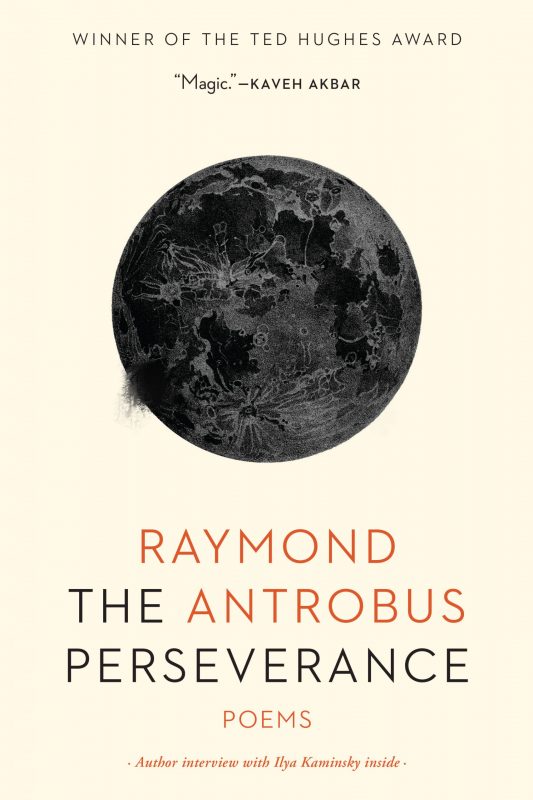REVIEW: RAYMOND ANTROBUS’S ‘THE PERSEVERANCE’
Reviewed by Stella Backhouse

The Perseverance, Raymond Antrobus’s debut full collection from 2018, is enveloped by poems that take us back to a time before anyone knew he was Deaf. Both poems recall his earliest attempts to speak his own name. In ‘Echo’, the opening poem, his older self, now equipped with hearing aids, listens to a recording of his younger self repeating “Antrob, Antrob, Antrob” with “Dad cackling in the background/not knowing I couldn’t hear the word ‘bus’”. He calls the missing syllable “the space of deafness”. The same space emerges again in the final poem ‘Happy Birthday Moon’. As his father’s finger “moves between words, tracing white space” in their reading book, Antrobus, to his father’s further amusement, christens himself ‘Rain-nan Akabok’.
It’s this conflation of identity with empty whiteness, and then the collision of both with Antrobus’s real-life red-hot rage, that ignites the collection’s energy. In the furious ‘Dear Hearing World’ he lets rip his frustration at having to live by other people’s rules, angrily indicting a society whose “judgement made my syllables disappear/your magic master trick…drowning out the quiet” and again summons the blankness of space, declaring that “Deaf voices go missing like sound in space/and I have left earth to find them”.
The culmination comes in the consciously controversial blanked-out poem ‘‘Deaf School’ by Ted Hughes’. To some, this deliberately unreadable poem (it retains Hughes’s structure but blocks out all the words), will exemplify everything that’s wrong with cancel culture. And as an engaged reader, I confess to an exasperated interest in getting a visual on Hughes’s words so I can decide for myself. But I don’t think that’s the point. I think the point is to present a starkly graphic representation of the clash between assumed/imposed blankness and boiling, visceral anger.
And why shouldn’t Antrobus be angry? In his poem (which can actually be viewed on Antrobus’s website), Hughes portrays D/deaf children almost as passive zoo exhibits: introspective, unreadable, living behind glass. He repeatedly characterises them as ‘simple’; he objectifies them and denies them a voice; he describes their communication as “a control-panel of gestures/Out there in the alien space/Separated from them”. Antrobus’s response is to smash the glass, storm the space, invite the hearing world in to experience it. But this is more than unmediated emotion. Through his poem without words, Antrobus is asking the most profound questions about what poetry is. Because if the hearing world can recognise a wordless poem as still a poem, all things become possible.
The Perseverance is not only about D/deafness. It’s also about Antrobus’s experience as mixed race – another liminal space, another space of uncertain identity with full acceptance forthcoming from neither side. The missing piece that links D/deafness and race together, he suggests, is colonialism – self-righteously abetted by that most rigorous of enforcers, organised Christianity. The hearing have colonised the realities of D/deafness and explained them in terms of their own narratives. Inability to hear the word of God becomes “a kind of Atheism” or the work of the Devil who “snatched/sounds from Samantha’s world/like a collector of voice boxes”.
Similarly, white discourse has colonised black bodies. On his father’s gravestone, Antrobus unexpectedly discovers the middle name ‘Osbert’, “derived from Old English/meaning God and Bright. Which may/have been a way to bleach him, darkest/of his five brothers”. It’s the poet’s Jamaican aunt who pulls these ideas together, looking beyond prescribed political narratives, hearing in non-auditory ways and creating her own space: Most dem on the Island/hear life in some Queen’s/English voice but I/was tuned to dem real power/lines, I was picking up all/the signals”.
Where Ted Hughes offers separation and othering, Antrobus confirms identity through the interrogation of space, the sharing of common ground and the opening up of enticingly unorthodox terrains. From the internalised beating heart (perhaps the precursor to violence) of “Antrob, Antrob, Antrob”, he moves outwards into universal human experiences of laughter, shared history and the unexpectedly enlightening mists of dementia where ‘normal’ rules don’t apply. And poetry itself is instrumental in creating these paradoxical new spaces, bending rage into silence, and silence into heat that speaks a language of its own: “Nowadays, instead of violence,/I write until everything goes/quiet. No one can tell me/anything about this radiance”.
The Perseverance is available online from Penned in the Margins and other bookstores.
